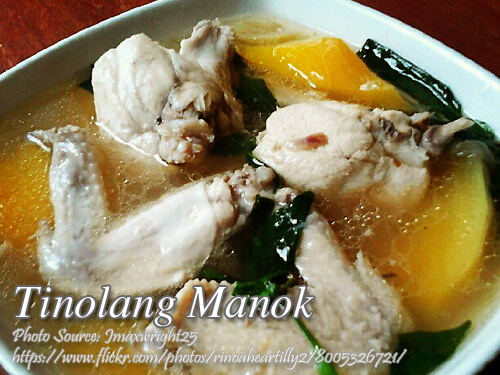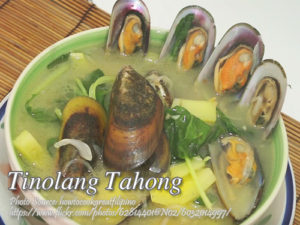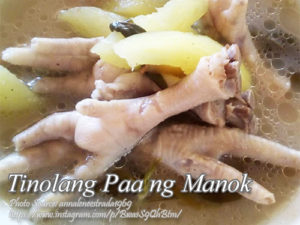Tinolang manok is one of the most popular Filipino chicken dish. Not only it is delicious, it is also simple to cook. There are three basic ingredients in cooking this dish, the chicken, unripe papaya and chili leaves. And the spices that should never be omitted are ginger, onion and garlic that makes up the flavor and of course, the seasoning that is a must is the patis or fish sauce. In case chili leaves are hard to find, specially if you are living abroad, spinach is a good substitute.
Tinolang Manok: A Comfort Food That Feels Like Home
Every time the rainy season rolls in, there’s one dish that always takes center stage on our table: tinolang manok. It’s warm, gingery, and soothing, like a hug from home. I remember one stormy afternoon in Lucena, my Lola Nene was humming an old kundiman as she stirred a steaming pot in her tiny kitchen. The whole house smelled of garlic, onion, and ginger—a scent so comforting it makes me homesick just thinking about it.
That day, she taught me how to make her version of this classic Filipino soup. She said the secret wasn’t just in the ingredients but in the love you put into making it. And to this day, I cook it the way she showed me, with a few tweaks I picked up along the way.
What Makes Tinolang Manok Special
At its core, this is a simple chicken soup. But what makes it unique is the use of fresh, whole ingredients that highlight the bright flavors of the Philippines. The key components are chicken (preferably bone-in for deeper flavor), unripe papaya, and chili leaves.
My cousin Bebeth in Nueva Ecija swears by using native chicken when available—it gives the broth a richer taste and a firmer bite. She raises a few in her backyard and claims no store-bought chicken can compare. When she visits us in Manila, she often brings a small cooler packed with freshly butchered manok and insists we cook it tinola-style.
The Trio That Builds Flavor
The flavor base for this comforting soup starts with ginger, garlic, and onion. You can’t skip these. Ginger gives it that warming zing, garlic brings the earthiness, and onion sweetens everything out.
A tip I got from my Tiyo Rodel, a former cook in Quezon, is to lightly bruise the ginger before sautéing. He says it helps release the oils better and infuses the broth faster. He also adds lemongrass—not a traditional ingredient for everyone, but in our family, it’s a must. It adds a fresh, citrusy aroma that lifts the whole dish.
How I Make Tinolang Manok Today
I start by heating a bit of oil in a medium saucepan and sautéing garlic, onion, lemongrass, and a generous amount of ginger. After a minute, I splash in some patis. I don’t stir it right away. Letting it sizzle for a bit deepens the umami flavor.
Once the aromatics are ready, in goes the chicken. I prefer thigh and drumstick parts for their flavor and tenderness. After it gets some color, I toss in cubed green papaya and stir for a minute. Then, I add enough water to submerge everything and drop in a chicken bouillon cube to give the broth a deeper profile. I simmer it for about 30 minutes or until the meat is fall-off-the-bone tender.
Towards the end, I throw in long green chili, onion leeks, and the all-important chili leaves. If I can’t find sili leaves here in Dubai, I use fresh spinach instead. It’s not exactly the same, but close enough to satisfy the craving.
Tinola Through Time
Did you know tinola dates back to pre-colonial times? It was even mentioned in Jose Rizal’s novel “Noli Me Tangere,” where Kapitan Tiago served it to Crisostomo Ibarra. That’s how embedded it is in our culture. For centuries, this dish has warmed Filipino kitchens and soothed tired souls.
What I love about it is how versatile it is. Some families add malunggay instead of sili leaves. Some use sayote when papaya isn’t in season. Others, like my Ate Judith in Davao, even toss in a handful of sliced green chili for extra heat.
A Bowl of Memories
Tinolang manok is more than a soup. For many of us, it’s the taste of our childhood. It’s Sunday lunch with family. It’s coming home from school soaked in rain, with a bowl waiting on the table.
It’s also one of the best dishes for beginner cooks to try. It doesn’t require fancy tools or hard-to-find ingredients. Just a good pot, fresh produce, and a little patience.
So whether you’re far from home or just looking for something nourishing to share with your loved ones, try this humble chicken soup. You might find, as I did, that it brings back more than flavor—it brings back home.
How to Cook Tinolang Manok
Ingredients
- 1 1/2 kilo dressed chicken cut into serving pieces
- 3 Tbsp. cooking oil
- 2 inch fresh ginger cut in strips
- 3 clove garlic crushed
- 1 pc medium-sized onion sliced
- 1 1/2 Tbsp. patis
- 1 tsp. salt or to taste
- 3 cups water add more if needed
- 1 pc small unripe papaya peeled and sliced
- 200 grams spinach or sili leaves
- 1 stalk onion leeks sliced
- 1 stalk lemon grass tie into a knot
Instructions
How to Cook Tinolang Manok:
- In medium size saucepan, heat oil over medium heat sauté ginger, garlic, lemon grass and onion for 1 minute. Add patis and simmer for 1 minute and do not stir.
- Add chicken and sauté until chicken colors slightly. Season with salt if needed. Cover and simmer for a few minutes.
- Add the unripe papaya and stir for a few minutes. Add chicken cube and water.
- Bring to a boil, lower heat and simmer for 30 minutes or until chicken is tender.
- Add long green chili, onion leeks and sili leaves (or spinach), cover and cook for 1 minute. Remove from heat let stand for 5 minutes.
- Serve hot. Good for 5 to 6 persons.
Video
Notes
Cooking Tips:
Use Bone-In Chicken for Deeper Flavor
Bone-in cuts like thighs or drumsticks infuse the broth with a richer, more savory taste as they simmer. The bones help extract collagen and natural oils that give tinola its signature comforting depth. Avoid using boneless breast meat alone, as it tends to dry out and won’t contribute as much flavor.Sauté the Aromatics Until Fragrant, Not Burnt
Start with ginger, garlic, and onion in hot oil and cook just until they release their aroma. This builds the flavor base and sets the tone for the entire dish. Be careful not to overcook them—burnt aromatics can give the soup a bitter aftertaste.Add Leafy Greens Last to Preserve Their Color and Texture
Whether you’re using chili leaves, spinach, or malunggay, always stir them in at the very end of cooking. This keeps them vibrant and slightly crisp, not soggy or overcooked. After adding the greens, cover the pot and let it sit for a few minutes off the heat to let the flavors meld gently.






You are welcome Shaine!
Nice tinolang manok recipe. Thanks for sharing this.